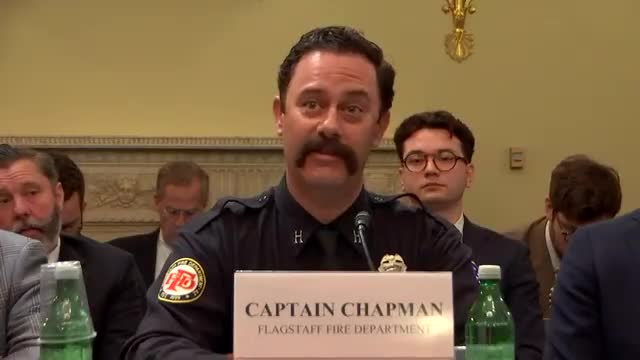Colorado Representative Boebert Advocates for Fixer Forest Act to Manage Wildfire Risk
May 16, 2025 | Natural Resources: House Committee, Standing Committees - House & Senate, Congressional Hearings Compilation
This article was created by AI summarizing key points discussed. AI makes mistakes, so for full details and context, please refer to the video of the full meeting. Please report any errors so we can fix them. Report an error »

The Oversight and Investigations Subcommittee of the U.S. House Committee on Natural Resources convened on May 16, 2025, to address critical issues surrounding forest management and wildfire prevention. The meeting featured discussions on the increasing risks posed by unmanaged forests, particularly in light of the ongoing beetle kill epidemic affecting millions of trees in the West.
Captain Chapman opened the session by emphasizing the importance of maintaining prescribed fire treatments to manage forest health. He warned that without adequate personnel to implement these treatments, the risk of catastrophic wildfires would rise significantly. This sentiment was echoed by Representative Lauren Boebert from Colorado, who highlighted the dire situation in her state, where approximately six billion standing dead trees contribute to a growing wildfire threat. Boebert stressed the need for proactive forest management to protect municipal water sources, as 80% of Colorado's water supply relies on healthy forests.
The discussion then shifted to the regulatory barriers hindering effective forest management. Boebert pointed out that wilderness area designations and the roadless rule limit necessary interventions, exacerbating wildfire risks. She called for the passage of the Fixer Forest Act to facilitate better management practices. Chief Muncy supported this view, advocating for the return of funds to local governments to ensure accountability and effective outcomes in forest management efforts.
Muncy also criticized the current allocation of resources, noting that funds intended for local communities often go to organizations lacking accountability. He proposed the use of technology and data-driven approaches to enhance transparency and effectiveness in forest management. The conversation underscored the need for cohesive leadership across federal agencies, as differing interpretations of policies by various forest supervisors can hinder progress.
The meeting concluded with a consensus on the necessity of integrating technology and artificial intelligence into the permitting process to streamline forest management efforts. Participants agreed that effective leadership and collaboration are essential to mitigate wildfire risks and protect communities reliant on forest resources. The subcommittee plans to continue exploring these issues in future sessions, aiming to develop actionable strategies for improved forest management and wildfire prevention.
Captain Chapman opened the session by emphasizing the importance of maintaining prescribed fire treatments to manage forest health. He warned that without adequate personnel to implement these treatments, the risk of catastrophic wildfires would rise significantly. This sentiment was echoed by Representative Lauren Boebert from Colorado, who highlighted the dire situation in her state, where approximately six billion standing dead trees contribute to a growing wildfire threat. Boebert stressed the need for proactive forest management to protect municipal water sources, as 80% of Colorado's water supply relies on healthy forests.
The discussion then shifted to the regulatory barriers hindering effective forest management. Boebert pointed out that wilderness area designations and the roadless rule limit necessary interventions, exacerbating wildfire risks. She called for the passage of the Fixer Forest Act to facilitate better management practices. Chief Muncy supported this view, advocating for the return of funds to local governments to ensure accountability and effective outcomes in forest management efforts.
Muncy also criticized the current allocation of resources, noting that funds intended for local communities often go to organizations lacking accountability. He proposed the use of technology and data-driven approaches to enhance transparency and effectiveness in forest management. The conversation underscored the need for cohesive leadership across federal agencies, as differing interpretations of policies by various forest supervisors can hinder progress.
The meeting concluded with a consensus on the necessity of integrating technology and artificial intelligence into the permitting process to streamline forest management efforts. Participants agreed that effective leadership and collaboration are essential to mitigate wildfire risks and protect communities reliant on forest resources. The subcommittee plans to continue exploring these issues in future sessions, aiming to develop actionable strategies for improved forest management and wildfire prevention.
View full meeting
This article is based on a recent meeting—watch the full video and explore the complete transcript for deeper insights into the discussion.
View full meeting